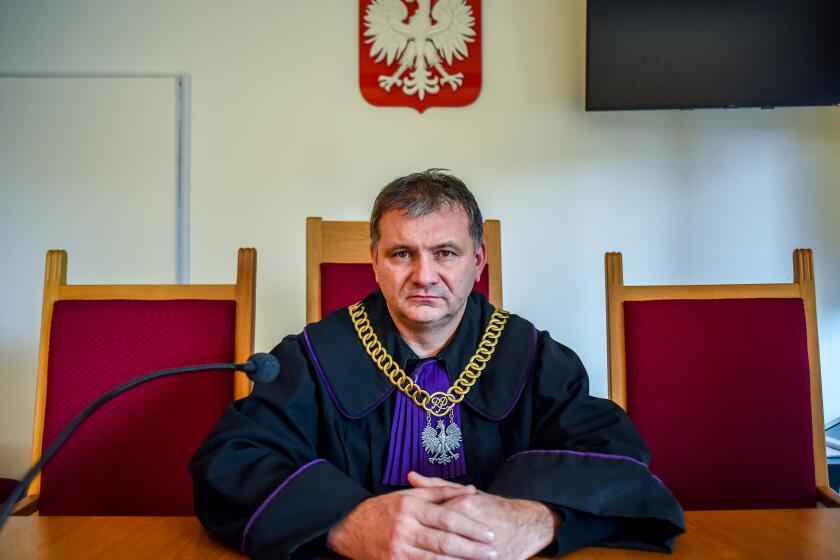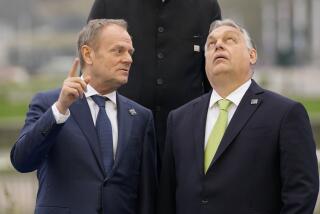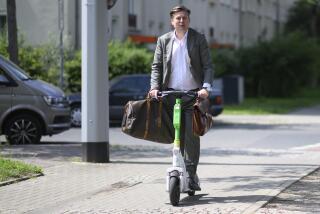This ‘gay, atheist, leftist’ is taking on Poland’s right-wing government — by running for president
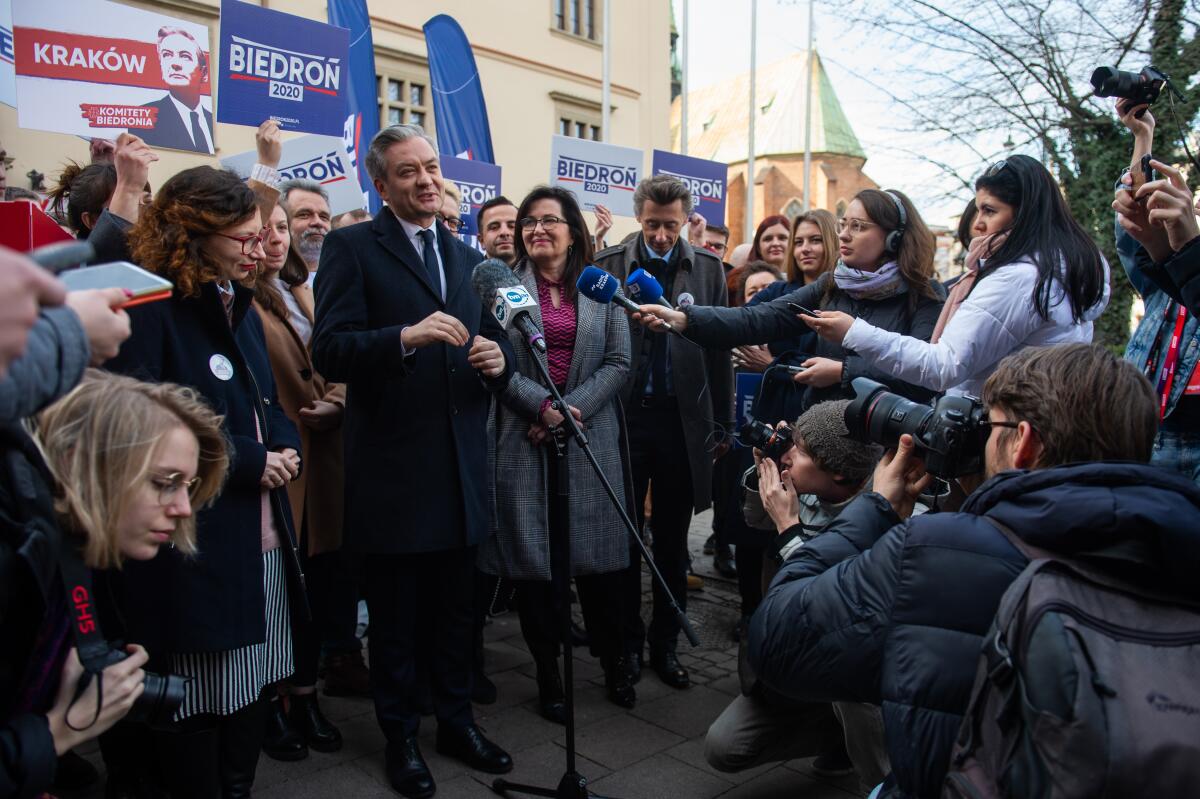
- Share via
KRAKOW, Poland — When Robert Biedron showed up in this historic city’s main square to lead a rally in his bid to be president, he was bracing for a fight in a region that is a stronghold for a right-wing government that abhors everything he stands for.
“An openly gay, atheist, leftist, anti-coal candidate?” said Biedron, a former small-town mayor who is as charismatic as he is polarizing in his pitch to turn this overwhelmingly Catholic nation leftward. “Who would imagine?”
This is a Poland, after all, where government leaders have joined the Catholic church to condemn gay rights as an “attack on children.” In the last year, nearly 100 communities have declared themselves free of “LGBT ideology.” The archbishop of Krakow recently decried a “rainbow plague” and complained of “sinister” environmental activists.
In the middle of this battle for tolerance and identity is Biedron, a direct affront to the long, seemingly inextricable link between church and state in Poland that has grown stronger as much of Europe has become more secular. About 87% of Poles are Catholics, the highest share of any European country, and more than a third attend Mass weekly. The number jumps to more than half among those older than 40.
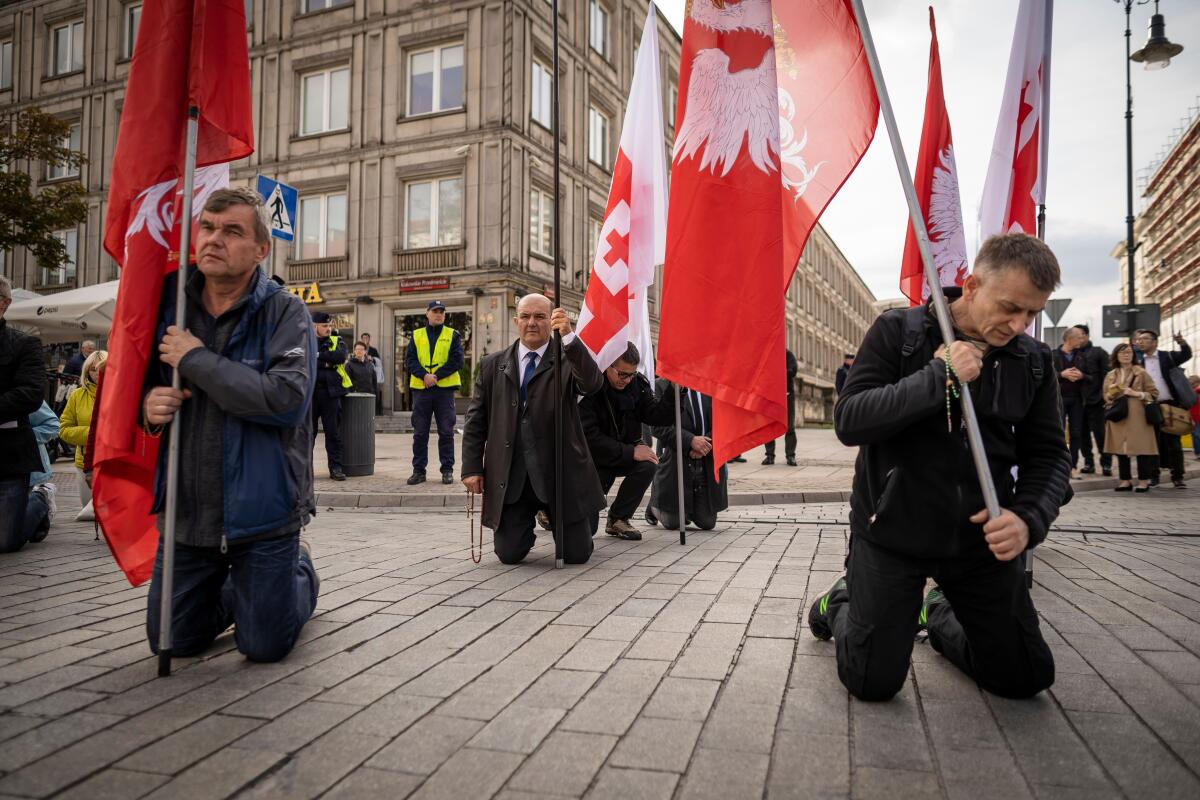
A former member of Poland’s lower house who currently serves in the European Parliament, Biedron is one of several challengers to the ruling Law and Justice party in May elections. He regularly polls at either a distant third or close fourth behind President Andrzej Duda. But Biedron’s rise over the years from activist to presidential contender has marked a turning point in this country of 38 million, as an increasingly vocal minority opposes the government and church’s grip.
During his march through Krakow’s medieval town square with dozens of supporters, Biedron ticked off a list of promises that contradicted nearly every policy in Poland today. The Catholic Church, he said, should be taxed and kicked out of schools, which are now compelled to give religious lessons. He proposed that abortion laws, among the most restrictive on the Continent, be relaxed. He wanted same-sex marriage legalized and anti-gay attacks counted as hate crimes.
Such talk startles the Law and Justice party, which has railed against Muslim refugees and aligned itself with the church to oppose growing secularism. “We want to reshape Europe and re-Christianize it,” the prime minister once said in an interview.
Judges like Waldemar Zurek say the nationalist government is intimidating them and putting the rule of law in Poland’s young democracy at risk.
Biedron has also taken aim at another pillar of Polish tradition. In a country that burns more coal than any in Europe after Germany, he has called for all mines to be shut down by 2035.
“Will we remain in this civilization of contempt that today’s rulers offer us today? … Will we choose a Poland of dignity, a civilization of dignity, a civilization that unites rather than divides?” he said in Krakow. “We are afraid the way of the current government is not toward Brussels, Paris or Berlin but toward Minsk, Budapest and Moscow.”
Biedron, 44, was born in southeast Poland in the small town of Rymanow, near the Slovakian and Ukrainian borders, and raised in nearby Krosno, a city of 47,000. His mother was in the Solidarity anti-communist movement. His father was a communist. Their son got his first major introduction to politics in 2001, when he co-founded the Warsaw-based Campaign Against Homophobia after marching in Poland’s first pride parade when he was 25. He led the group for eight years. In 2011, Biedron joined the Sejm, Poland’s lower house. The first openly gay man in Parliament, he ran under Palikot, a left-wing, anti-clerical movement.
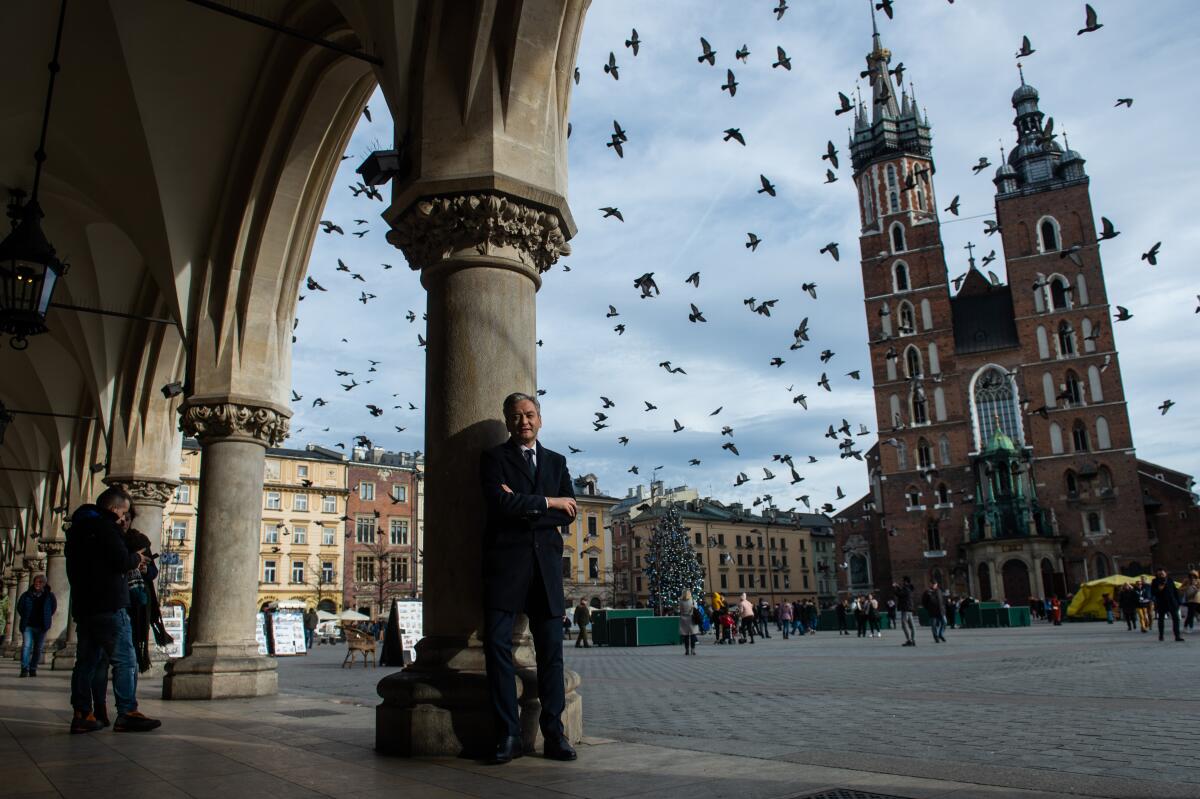
Three years later, Biedron won elections to become mayor of Slupsk, a city of 97,000 near the Baltic coast. He faced critics from the onset, including those who called him a careerist for seeking the job despite living hundreds of miles away in Warsaw. In office, he took a pay cut and traded his mayoral limo for a bike, slashed mounting debt, and pushed the city toward renewable energy sources.
He banned bottled water in City Hall and occasionally sat in a big red couch in the middle of town to talk to constituents. Opponents accused him of staging publicity stunts. When he took down the portrait in his office of Pope John Paul II — a national treasure who was once the archbishop of Krakow — they said he was an insult to the church and Polish pride. Same-sex marriage was illegal, but Biedron described Slupsk as Poland’s Las Vegas for the number of gay couples who traveled there to have him officiate their partnership ceremonies.
A year ago, Biedron, whose popularity is strongest with with younger Poles, launched his own party, Wiosna (“Spring”). Under it, he was elected to European Parliament. The party won 19 seats in the Sejm in October. That’s a tiny fraction of the chamber’s 460 total seats, and Wiosna’s influence on politics is slim compared with the the ruling Law and Justice party. It has a larger stamp under an alliance called Lewica (“Left”) that includes two additional progressive parties and holds a total of 49 seats.
As a presidential candidate, he has pushed a platform of upping healthcare spending, lowering prescription drug costs, increasing pension funds and replacing religious lessons in schools with “environmental education.” He has also called for legalizing abortions up to week 12 of pregnancy. Right now, they are allowed only in the cases of rape, incest or threats to the life of a fetus or pregnant person.
The backlash has been harsh.
“Anti-Polish political whores,” a right-wing magazine, Warszawska, recently said on its cover over a photo of Biedron and other politicians who have spoken out against the government’s clash with the European Union over attempts to overhaul its courts.
Other critics zero in on his sexuality. At a conference in February, a Polish European Parliament minister mocked Biedron’s partner as a candidate for “first lady.”
“His main activity as a minister of parliament was to represent homosexuals,” Michal Drewnicki, a Law and Justice member who is vice president of the Krakow City Council, said in an interview. “Robert Biedron represents extreme left-wing views on moral issues. He is unlikely to convince most Poles because he has lost credibility.”
Approval ratings are high for Law and Justice, which has gotten a boost from the nation’s historically low unemployment rates and from popular welfare programs, such as a 500-zloty monthly allowance — about $126 — for each child in a family. Duda’s biggest opponent, Malgorzata Kidawa-Blonska of the Civic Platform party, is currently polling around 26% and could force a runoff election. Biedron, whose support hovers around 9%, has attacked Civic Platform, calling it corrupt and “not really on the left.”
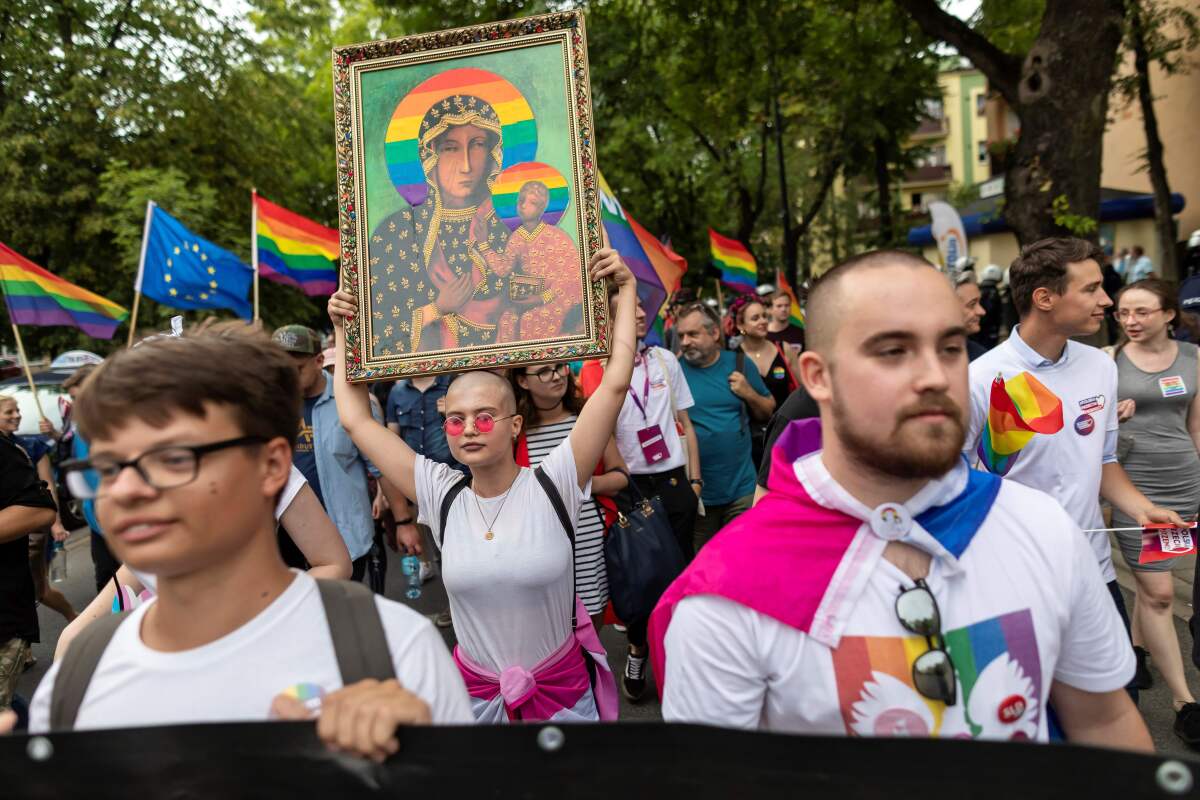
In interviews, Biedron said he was influenced by Vermont Sen. Bernie Sanders, who surprised U.S. pollsters by winning early Democratic contests despite being the most radical in the field. Biedron has also drawn comparisons to French President Emmanuel Macron, a long-shot candidate who came from outside big parties before his election.
Central and Eastern Europe are, of course, a different picture. The Polish government has modeled itself in part on Hungary, where conservative, nationalist Prime Minister Viktor Orban has consolidated power. In Czech Republic and Slovakia, progressive parties struggle to maintain influence. The church continues to wield wide influence in Poland despite declining popularity in neighboring nations.
Around Krakow, the capital of one of Poland’s most conservative provinces, Biedron’s pitch is an especially hard sell. While thousands rallied this month at Duda’s reelection kickoff in Warsaw, Biedron drew no more than 100 supporters to a news conference and rally in the center of town.
Many were young and disillusioned with the current government.
“When Robert appeared on the political scene, it gave me hope,” said Magdalena Dropek, 37, a campaign organizer who is an administrative assistant for Maciej Gdula, a local Wiosna member in the Sejm.
“The homophobia has been very difficult for us. Our coming-out stories are political, and his candidacy is a tool for change,” said Dropek, who is bisexual and wore a pin depicting rainbow and European Union flags crossed.
Another supporter, Maciej Kolarski, said he’s admired Biedron since he was a mayor.
“It’s just how he ran the city. He talked to people, constituents, random people, even those against him,” said Kolarski, 30, a recruiter at UBS, the Swiss multinational bank. “If we can have someone who will be doing the same on a national level, that would be great.”

At Club Jaszczury, a cafe and event venue on Krakow’s central square, Elzbieta Kowalska cheered Biedron as he walked onstage.
A retired police officer of 30 years, she saw her pension cut two years ago under a controversial law targeting officers who served under communism. Biedron vows to reverse the rule.
“Robert follows the law, and wants to withdraw these kinds of illegal regulations that our government keeps putting on us,” said Kowalska, who added she was heartened by his support of LGBTQ and secular causes.
In his speech, Biedron hinted that his chance of winning was slim. But, he said, “a year ago it was unthinkable” that he would lead a party with members in the Sejm, or be a presidential contender. He said his movement would continue no matter the results in the spring.
Listing his anti-church, anti-coal and pro-LGBTQ platform, he riffed on an American campaign to support his own.
“Make Poland great again!”
More to Read
Sign up for Essential California
The most important California stories and recommendations in your inbox every morning.
You may occasionally receive promotional content from the Los Angeles Times.

